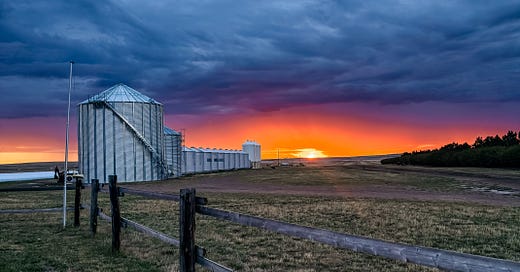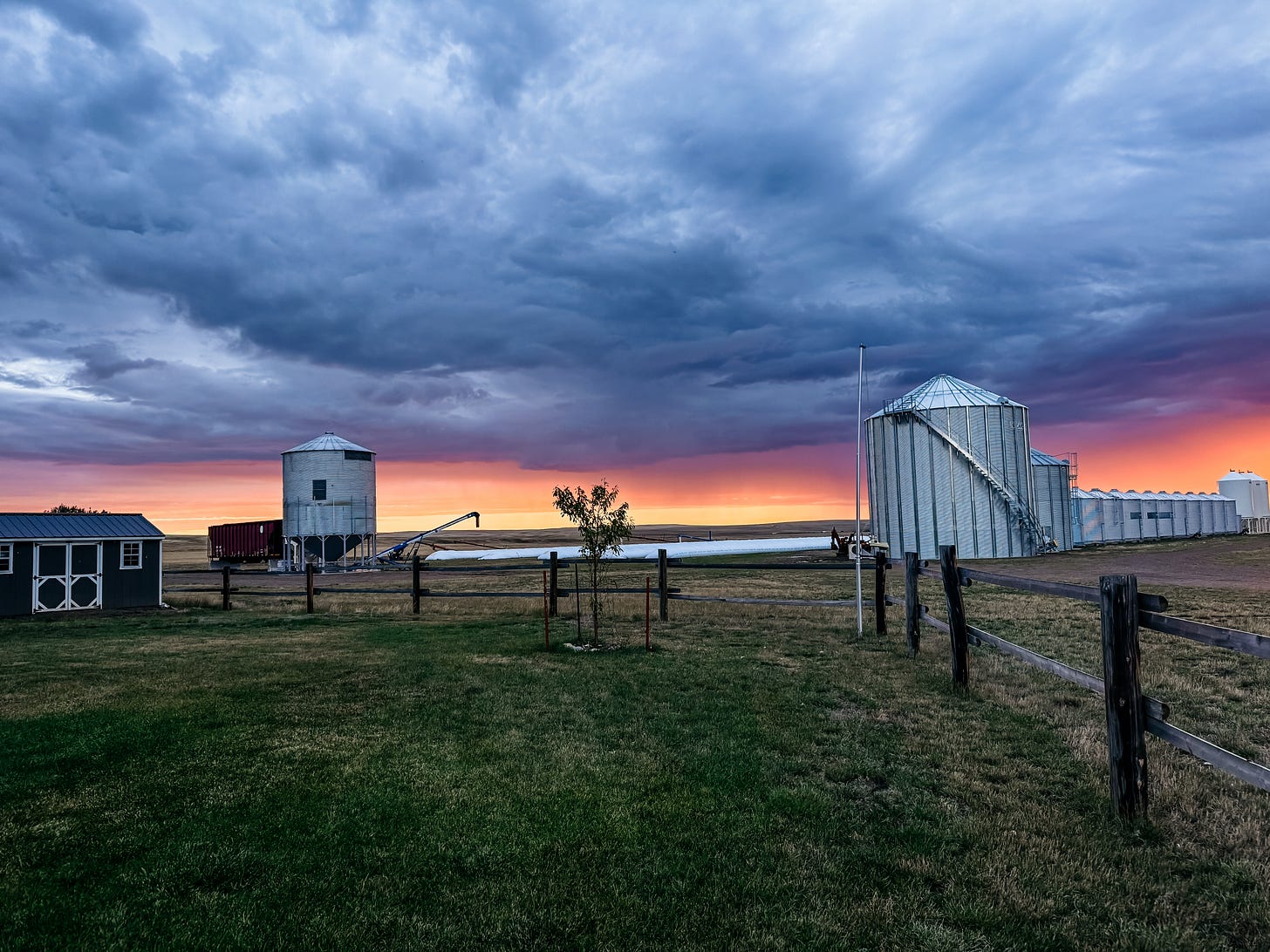Are Internet Friends Real Friends?
thoughts on friendship, drought, and where we find our worth
It’s dry again, the fields, my words. The storms keep going around us. The temperature reached 95° last weekend. This is not normal for early May. The words swirl like a storm in my head, but escape the page.
On Saturday, the sweltering hot day, we loaded the kids’ bikes into the SUV and made the 45-minute drive to town, so they could ride bikes on pavement. The three of them rode their bikes around the no-stop-light town like town kids. Rich and I walked behind them, helping Nora ride a pedal bike for the first time. My t-shirt clung to my body, unacclimated to the heat after months of winter. We all got ice cream cones and picked flowers at the greenhouse to plant at home.
A question I keep asking myself won’t go away. I keep scribbling the line in my notebook, writing in stops and starts, too scared to ask it out loud. Are Internet friends real friends? It feels like too scorching a question to ask or wonder about online.
Years ago, when I was new to farm life, I turned to social media for connection, to fill the loneliness I felt. Rural life can be isolating, and not just because of the distance from town. The Internet was at my fingertips, the whole world in front of me, without leaving the house. It seemed like a solution, rather than a problem, at first. I found many farm wives and women in agriculture sharing their lives from around the country. I hoped they could fill the hole in my new life. I commented and shared, liked and sometimes DM’d. But mostly, I was left feeling cold, on the outside.
It felt, feels, like there’s a group of women to be included in, a clique if I’m so bold to say—you have to be invited, let in. It didn’t stop me from trying—for years. I kept digging at the dry well, convinced my thirst would be quenched. Still today, I can’t help but wonder, did I not try hard enough? Or did I try too hard?
A couple of weeks ago, it rained, barely. Rich said, “It’s better than a poke in the eye with a sharp stick, but it won’t make a crop.” All around us, other farms received more, much more. It’s hard not to be jealous.
Thankfully, my words don’t put food on the table. But the lack of rain will kill the crops. I won’t be so dramatic as to say I’ll die if I don’t write. But it’s how I process my feelings, it’s how I make sense of the world around me. I can’t stop doing it, even when I tell myself to give up.
Is a drought less of a drought if no money is to be made?
I have ‘in real-life friends’, but rural life makes it difficult when we live so far apart. In the early years of motherhood, when I led a MOPS group, we saw each other two times a month, like clockwork. I could count on that time together. Now, our kids are mostly in school, and the clock rotates around their schedules—not ours.
After weeks of back-and-forth texts, trying to find time to meet up, a friend and I made dinner reservations. While we sat at dinner, she asked how my writing was going. I shrugged, never knowing what to say. I’m writing, but I feel like I don’t have enough to show for the last decade. My youngest is almost five, and I can’t help but wonder if I’ve wasted their childhood on my little hobby. I lament to her how hard it is to be vulnerable, putting in the time and effort, not knowing if it will bear fruit. She said, “Maybe you’re making it too much about you, not Him.” I could have been offended. I could have let her words burn me, but I knew she was right. She said, “You have a gift, but it’s not from you.”
I have friends I met online with whom I Vox and send the occasional text. I consider them “real” friends. And I’ve witnessed other women’s online friendships flourish. So I know that genuine friendships can be made on the Internet.
I know some of my envy isn’t just in the friendships I see, but in the professional collaborations I’ve watched online and the opportunities I’ve wished to be a part of. Roles and bylines that would signal to me that I’m “good” enough, that the years of planting seeds and writing stories weren’t for nothing.
Likely, I’ve been asking myself the wrong question.
The better question is, why am I searching for my worth horizontally—on a screen—instead of vertically?
After we returned home from town that hot Saturday, the words kept coming, while the temperature dropped. I sat with my notebook on the patio, watching the kids splash in the pool. My pencil flowed across the page, unused to the words pouring out.
“It looks like rain,” I told them, looking up from my scribbled words, as the dark sky moved toward us. But I guess I’m cynical enough after 12 years of farm life, and I didn’t think it really would. I put my pencil down, the words cooling.
I wondered if I said too much, my jealousy dripping from the page.
Why does my husband keep farming, year after year, knowing a drought or hail could happen? Why do I trust that the work we do in the field is enough, even though we’re never guaranteed a certain outcome?
The rain doesn’t come on Saturday, or Sunday either. The kids and I planted the flowers in the half-whiskey barrels in our yard. We worked together, digging holes and placing the roots firmly in the soil. We turned on the hose, giving them a much-needed drink. As I washed dishes that evening, I saw the bright colors from the kitchen window, remembering how excited the kids were to help me and to just be with me.
The next day, Mother’s Day, our pastor preached about mothers in the Bible. He told us how important the role of a mother is. “Maybe you’ll never do anything the world deems significant, like writing a book.1 But you’re pouring into your kids, and that’s all that matters.”
He reminded us that God doesn’t expect perfection. He said to give your kids grace, and yourself grace too.
All summer, in the cool evenings, I’ll pull the weeds and keep the flowers watered. I’ll make the kids dinner (and breakfast and lunch and so. many. snacks), and I’ll break up sibling squabbles. They’ll ride in tractors and drive them, too—a farm kid summer. They’ll see the crops grow until they’re ready to harvest. Or they’ll watch the crew work tirelessly, putting in the work—only to see the crop fail, right in front of them. They’ll have their own stories someday, and I pray there’s enough grace to cover the times I made their childhood too much about me.
It’s hard not to measure life by worldly successes: the number of bushels harvested, books written (or not), jobs on our resume, how many friends we have, and the number of followers on social media. Deep down, I know these things aren’t the most important—my worth is not in my accomplishments—but it’s easy to forget. I often want instant gratification, something tangible to show for my efforts.
I know the things that really matter are: bike rides around town, ice cream cones on a hot day, harvest meals, dinner with friends who remind you of what’s important, our love of Jesus, and the countless other things—little and big—that make a life.
I’ll keep giving my kids grace, and offer grace to myself too. I know I’ll still struggle, jealousy flaring up from time to time. I’ll never be perfect. I’ll tend to my friendships—online and in real life—that are a two-way street. I won’t return to dry wells. I’ll keep writing, not because something “big” might come of it, but because I feel called to.
I’ll water the seeds I can, and pray for the ones I can’t.
One evening, my father-in-law stopped by our house on his way home from hauling grain. The sky was dark with empty threats. He said, “Like my uncle used to say, ‘It has to rain sometime. We just don’t know when, or what we’ll get.’”
We stood silently, nodding toward the stormy sky, waiting and hoping. In the end, it’s all we can do.
He gave some other examples, but this obviously stuck with me.






I've read alot in my life, and it's often just short pieces a person writes. Radio seems hard like that too, broadcasting to strangers you'll likely never meet. But listening on that drive, or while reading with that cup a coffee, that person's story feels like the most interesting soul. Appreciate those stories from the farm front, whenever they sprout up. . . and God send you that rain, Stacy.
This resonated with me so much, especially the line about "wasting" a child's childhood on our writing dreams. I'm in a season with two under three, working full time and building a an ag small business with my husband as we dream of owning a farm someday and I wrestle with this too, even as I know that my writing and words are a gift from God that I cannot hold in or keep to myself, but I am prone to still make it about me, not Him and that's when it becomes a burden, not a gift.